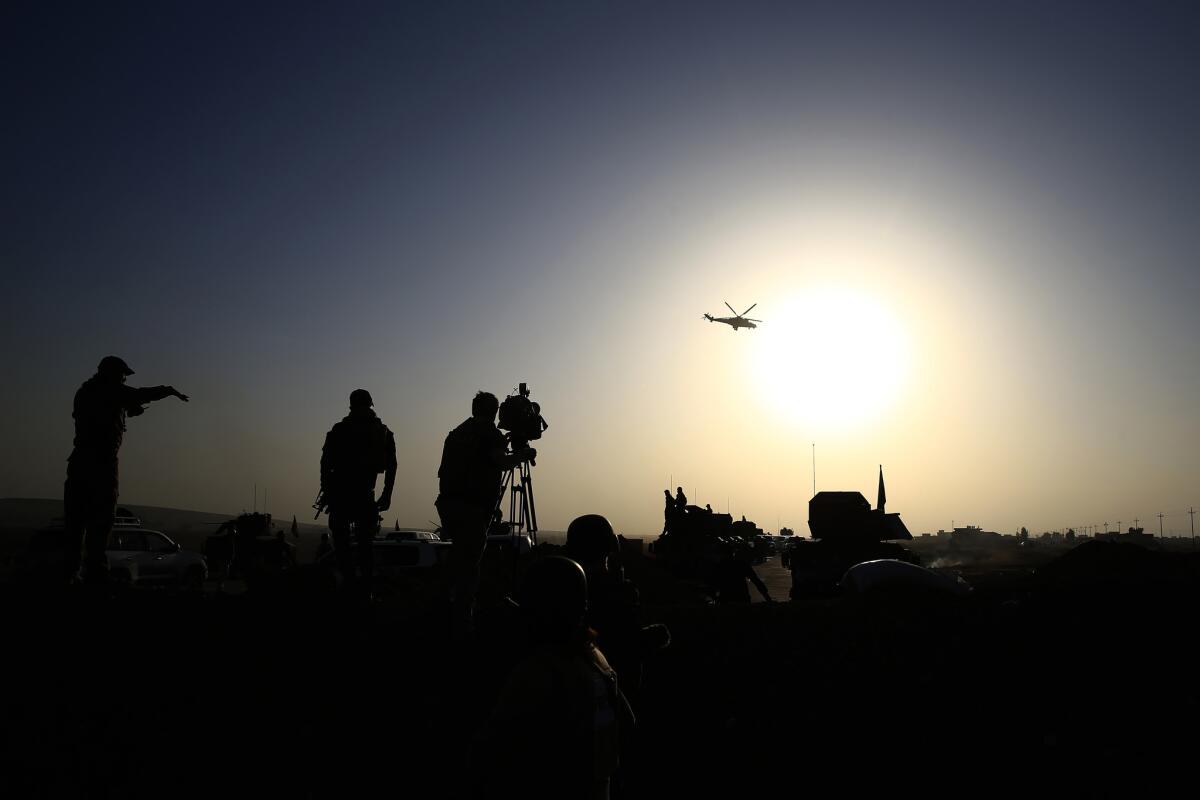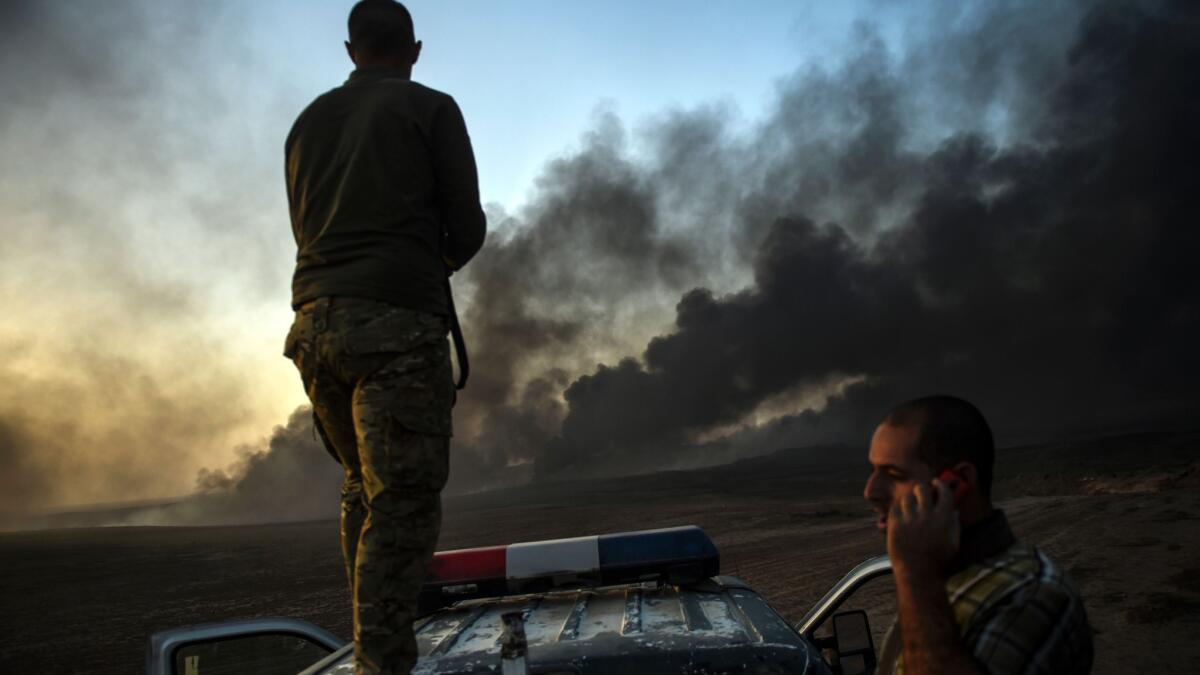Dispatch from the front lines: Intense fighting as Iraqi forces drive toward Mosul; U.S. service member killed

- Share via
Reporting from NAWARAN, Iraq — First there was a rocket, flying low, kicking up dust before it smacked the ground in a fiery bloom. Then an Islamic State suicide bomber gunned his car toward the Iraqi Kurdish fighters.
The car exploded in a fireball crowned with a plume of black smoke, and the earth shook. Though dazed, the Kurdish troops recovered fast, loading a wounded comrade into an ambulance. Then all was calm once again.
It has fallen on the Kurdish fighters, known as the peshmerga, to secure areas east and north of the Iraqi city of Mosul, Islamic State’s de facto capital and the heart of its once seemingly unstoppable caliphate, even as other Iraqi security forces advanced from the south.
In the early hours Thursday, four days into the long-anticipated campaign to take back the city, thousands of the Kurdish warriors gathered at three sites across the mountain ranges to Mosul’s north.
Their aim was to take 27 villages and deny the jihadists access to areas they once traversed with near-impunity, according to the peshmerga’s general command.
Yet despite reports of rapid advances in the opening moves of the Mosul offensive, this was no thunder run. What emerged instead was a battle of fits and starts.
Interactive: Click the video and drag your cursor for a 360-degree view.
Even before a column composed of dozens of Kurdish armored vehicles, trucks and tanks threaded its way through the fields between the villages here, Islamic State launched two fixed-wing drones, one that was shot down by a burst of gunfire so intense it sounded like a drumroll.
Meanwhile, artillery and warplanes from the U.S.-led coalition pummeled jihadist positions before advancing security forces encircled some of the villages, firing on anything that moved. Islamic State militants, though outnumbered, hid between buildings to lob mortar shells and rockets, shoot at soldiers or dispatch car bombs.
“We have to clean this area…. We’re used to fighting Daesh and know their strategy,” said Gen Aziz Waisy, commander of the Kurdish Zeravani Special Forces, which spearheaded the attack from Mt. Nawaran, about 14 miles northeast of Mosul. Daesh is Islamic State’s Arabic acronym.
The battle for Mosul: How to free 1 million residents without killing them »
The general, emerging from a Humvee that had moved up the column during a lull in the fighting, said this was the closest his units had gotten to the city.
“We’re very motivated. We know that Daesh is an enemy we have to destroy,” he said.
In a vehicle nearby, one veteran fighter, 34-year-old Sadeq Raouf, sang popular Kurdish tunes and cracked jokes as small arms fire crackled and mortar shells dropped nearby at the rate of once a minute. Raouf and his colleague, a young fighter named Fakhr Din, would stop occasionally to fire their M-16s at buildings where they suspected the militants were bunkered.
Later in the battle, Humvees and technicals established a perimeter, allowing bulldozers to create a berm to impede car bombers from approaching.
Even here, the schizophrenic nature of the battle could be seen: One commander, a blue disposable razor poised before his face, squinted into a silver-framed mirror propped on his armored vehicle. He took one cautious swipe when the high-pitched whine of an incoming mortar shell drowned out the sounds of outgoing gunfire. It fell less than 10 yards away. He then continued to shave.

Yet there were losses in Thursday’s operation. A visiting reporter saw two Kurdish fighters evacuated from the front line, one with severe head injuries. Local media spoke of at least five killed and others wounded, and there were unconfirmed reports of greater casualties.
The Pentagon said Thursday that a U.S. service member was killed in a roadside bomb blast.
The soldier had been assisting in the Mosul offensive, making him the first American casualty in the campaign, which has incorporated more than 5,000 U.S. troops who are officially acting in an “advise and assist” capacity to the various fighting groups in Iraq.
U.S. and British special forces units, however, have taken a more active role .
Officials would not comment on whether the soldier was embedded with the Kurdish fighters or other Iraqi security forces, but said that he was hit while traveling in a vehicle and that no one else was injured.
Meanwhile, Iraq’s elite special forces units mounted their own offensive in nearby Bartella, a Christian town just 13 miles east of Mosul, which Lt. Gen. Talib Shaghati, a senior commander with the counter-terrorism forces, said was a “main defensive line” in front of the advancing troops.
“I declare to the families of Bartella and Mosul that we have achieved full control of the town of Bartella,” Shaghati said in a news conference Thursday evening. Soldiers nearby, however, said that pockets of Islamic State fighters remained and that there was still a risk of car bombs.
Disparate gunfire could be heard in the outskirts late Thursday, and one special forces operative had to be evacuated.
The town, which was overrun by the jihadists in late 2014 during their blitz campaign to take large swaths of the Nineveh plains, was said to be deserted, Shaghati said. Many of its residents had escaped to the city of Irbil in the days after its capture.
“The fall of this town in our hands means we are ready for Mosul. We give tidings to our people in Mosul that we are on the way,” Shaghati said.
He insisted casualties on the government side had been minimal while more than 15 vehicles used by car bombers had been destroyed. Amaq, a news agency affiliated with Islamic State, said in a report Thursday that “six martyrdom operations” struck government forces in Bartella, a reference to the suicide attacks .
The advances come as Iraqi Prime Minister Haider Abadi addressed a gathering of Western and regional diplomats in Paris to discuss plans for the future of Mosul after Islamic State has been ousted , saying that the campaign was progressing faster than planned.
“Iraq today is closer than any time in the past in its unity and determination to liberate this land from the terrorists.”
ALSO:
In Turkey, you can be arrested for having this app on your phone
The U.S. may be the ‘Great Satan’ in Iran, but some still want to win the U.S. visa lottery
A genocide overlooked: A Catholic priest works to bring attention to the mass killings of Yazidis
UPDATES:
3:45 p.m.: This article was updated with a staff-written report.
This article was originally published at 8:25 a.m.
More to Read
Sign up for Essential California
The most important California stories and recommendations in your inbox every morning.
You may occasionally receive promotional content from the Los Angeles Times.











